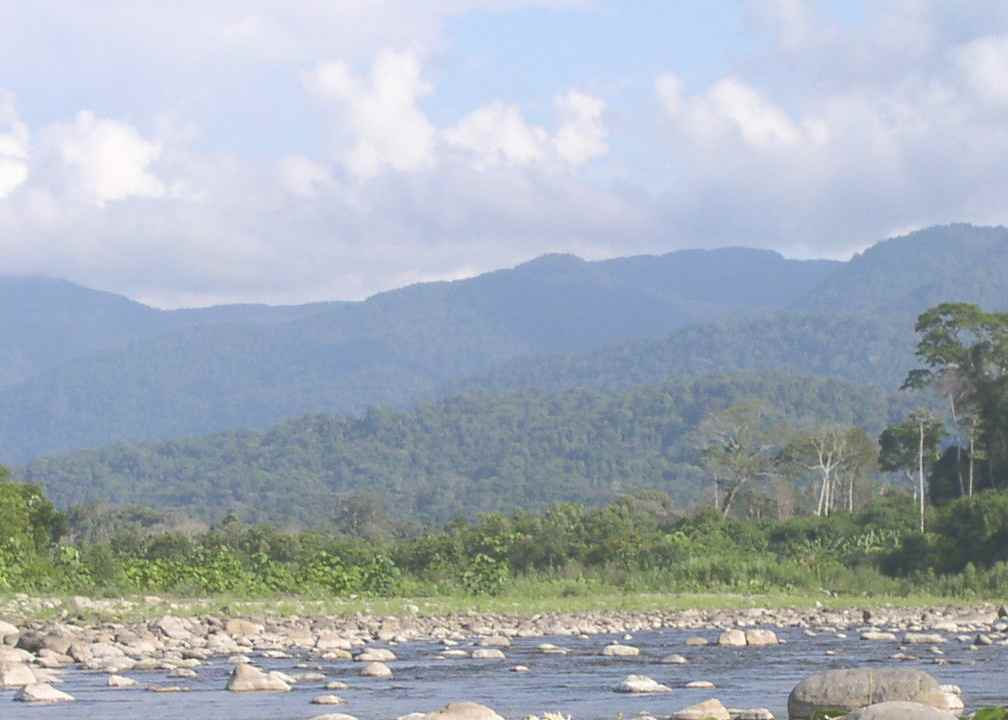
 Cabeceras Aid Project
Cabeceras Aid Project
 Cabeceras Aid Project
Cabeceras Aid ProjectPosted: December 9, 2019
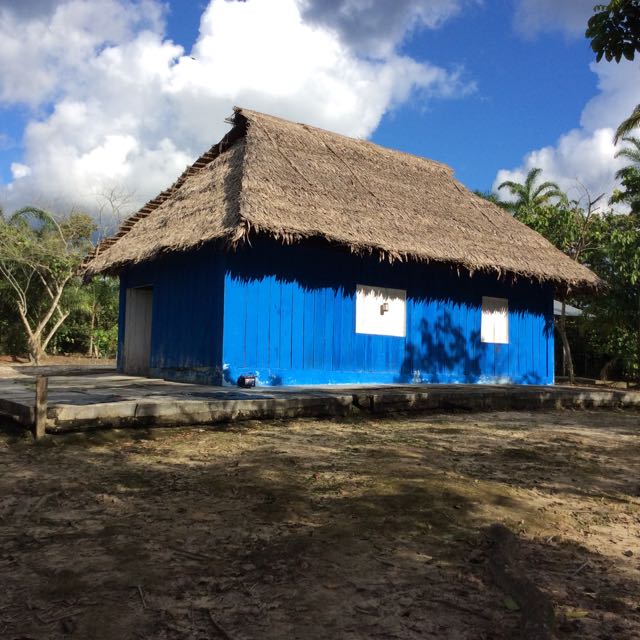 Hello friends!
Hello friends!
It's a pleasure to share with you this latest update on Cabeceras' recent activities, which includes sharing some very exciting news from the Iquito Language Documenation Project, as well news from the Máíhiki Project, from our scholarship program, from the AMAZONICAS conference, plus a few other collaborations, topped off with a new volunteer opportunity for you.
Please read on to find out what we've been doing lately — and please consider making an online donation to Cabeceras right now to support our unique and effective work with various small indigenous communities in Amazonia. Of course, if have already supported us recently, thank you!
With best regards,
![]()
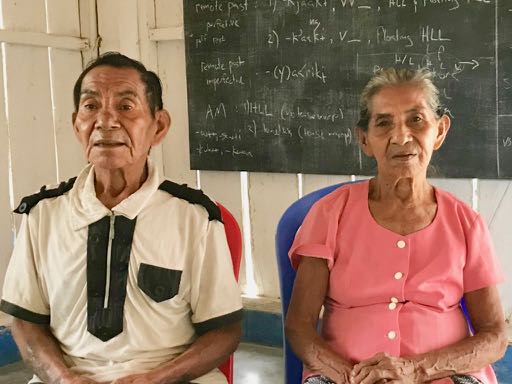 As you may recall, since 2014 the central focus of Cabeceras' language revitalization and documentation work has been our collaboration with our Ikíitu (Iquito) friends and colleagues — and especially our two beloved and enduring speaker-teachers, Ema Llona Yareja and Jaime Pacaya Inuma, pictured together, at left, in a recent photo. Below right is a photo from 2015, when Hermengildo Díaz Cuyasa was still with us.
As you may recall, since 2014 the central focus of Cabeceras' language revitalization and documentation work has been our collaboration with our Ikíitu (Iquito) friends and colleagues — and especially our two beloved and enduring speaker-teachers, Ema Llona Yareja and Jaime Pacaya Inuma, pictured together, at left, in a recent photo. Below right is a photo from 2015, when Hermengildo Díaz Cuyasa was still with us.
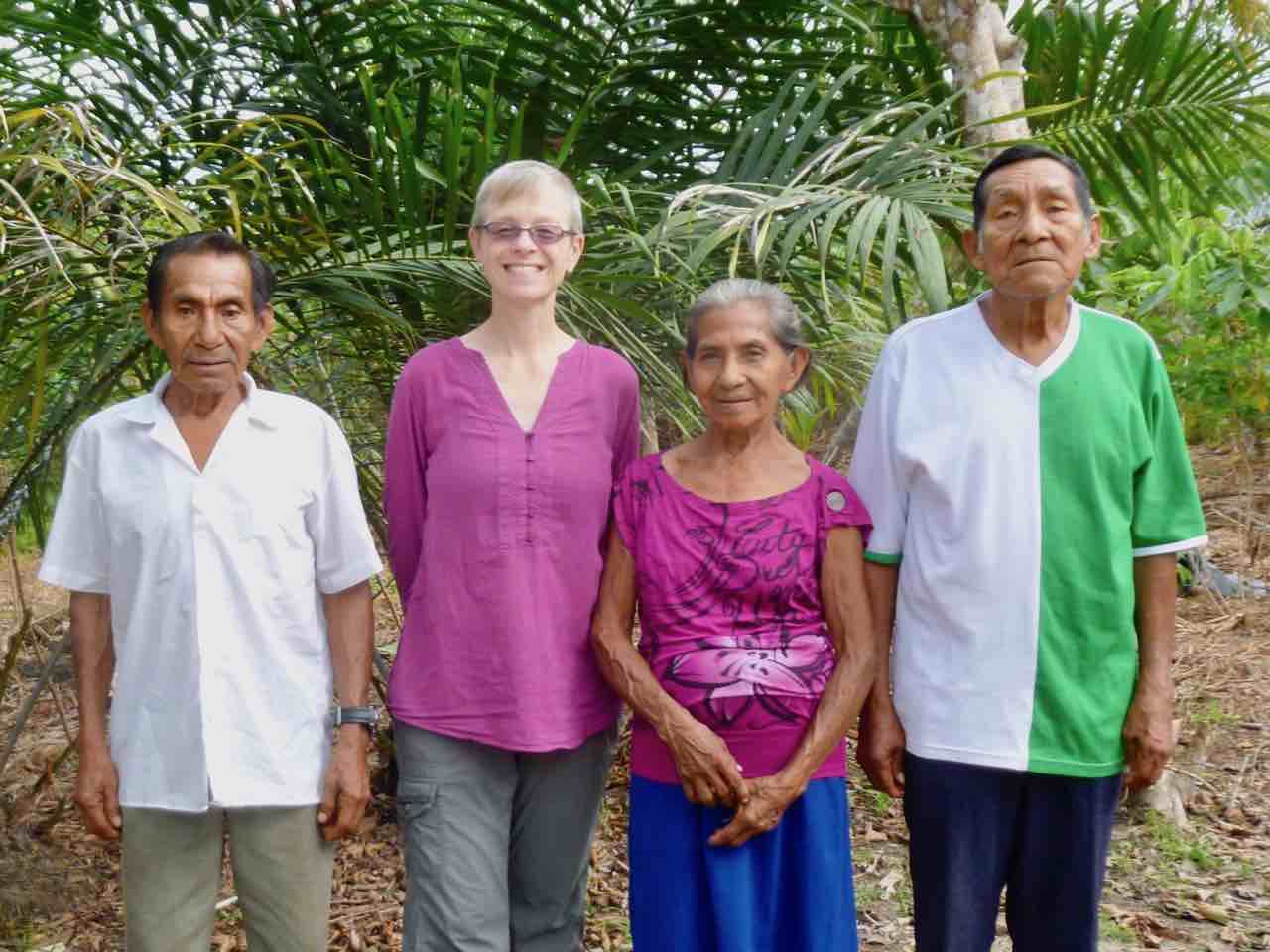 Since we first launched the ILDP in 2001, one of our driving objectives has been to publish and circulate a series of high-quality dictionaries of Iquito, each designed to serve the needs of a particular set of readers and users. In 2006, at the end of the first phase of the ILDP, we released and circulated the first of this series, in the form of a good draft version of a basic Iquito–Loretano Spanish dictionary.
Since we first launched the ILDP in 2001, one of our driving objectives has been to publish and circulate a series of high-quality dictionaries of Iquito, each designed to serve the needs of a particular set of readers and users. In 2006, at the end of the first phase of the ILDP, we released and circulated the first of this series, in the form of a good draft version of a basic Iquito–Loretano Spanish dictionary.
Since launching the second phase of the ILDP in 2014, Lev and I have been working intensively to develop and expand our Iquito lexical material into four different types of dictionary:
• an Iquito–Loretano Spanish students' dictionary, designed for use by language learners in the Iquito heritage community,
• an Iquito–Loretano Spanish version designed for advanced learners and regional users,
• an Iquito–English version, and
• an Iquito–Standard Spanish version, these last two versions designed for use by national and international users.
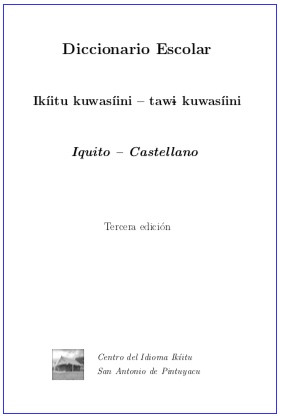 And this is finally happening!
And this is finally happening!
Thanks to a long-awaited sabbatical leave, which we are dedicating to fieldwork on Iquito here in Peru, over the 15-month span from June 2019 to August 2020, Lev and I are finally able to sprint forward on finalizing various concrete products of the ILDP.
First, in August of this year, we released and began to distribute a new Iquito–Loretano Spanish students' dictionary — its actual title is Diccionario Escolar Ikíitu kuwasíini–tawi kuwasíini (Iquito–Castellano). At 388 full-size pages, this dictionary is a substantial resource, and community members have told us that they are very pleased with it. Concretely, we are providing spiral-bound paper copies free to all heritage community members, and as well as circulating the PDF free of cost at Cabeceras' website. We invite you to have a look at it yourself, here!
Then in September, we submitted the first edition of the Iquito–English Dictionary to Editorial Abya-Yala, a publishing house in Quito, Ecuador, whose specific focus is indigenous peoples and topics in Latin America. At ~650 pages, this dictionary provides more in-depth definitions and more detailed information than the students' dictionary does. It should be available in print early next year.
Our next milestone will be finalizing the Iquito–Standard Spanish version of the dictionary, which will be equal in depth to the Iquito–English dictionary. It will be ready for publication, also with Editorial Abya-Yala, in mid-2020. These two volumes, along with a second print run of the Diccionario Záparo Trilingüe, will be part of a series of dictionaries that Abya-Yala is launching in honor of UNESCO's International Year of Indigenous Languages.
The fourth and final dictionary, the Iquito–Loretano Spanish dictionary, will follow as soon as humanly possible after those two. At the same time, we also are making significant progress toward publishing our first trilingual collection of Iquito–Spanish–English texts as well as a descriptive grammar of Iquito, so our sabbatical time is just flying by.
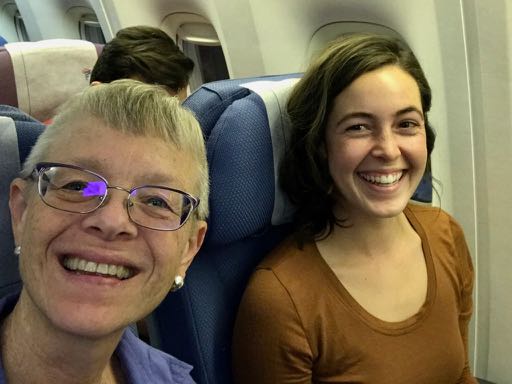 Another exciting facet of this sabbatical year's intensive focus on Iquito is that we have taken on an outstanding new field intern, Emily Leggitt, who is here to help us with various aspects of the ILDP text collection. Emily completed her B.A. in Linguistics at UC Berkeley in December 2015, and since then she has worked with Lev sporadically, mostly remotely, on various of his research projects. Now, thanks to tremendous luck on our part and generosity on her part, she is here in Peru to work with us here fairly steadily through the next several months. At right, Emily and I are pictured on our flight from California to Peru last month. Emily, it's wonderful to have you on our team!
Another exciting facet of this sabbatical year's intensive focus on Iquito is that we have taken on an outstanding new field intern, Emily Leggitt, who is here to help us with various aspects of the ILDP text collection. Emily completed her B.A. in Linguistics at UC Berkeley in December 2015, and since then she has worked with Lev sporadically, mostly remotely, on various of his research projects. Now, thanks to tremendous luck on our part and generosity on her part, she is here in Peru to work with us here fairly steadily through the next several months. At right, Emily and I are pictured on our flight from California to Peru last month. Emily, it's wonderful to have you on our team!
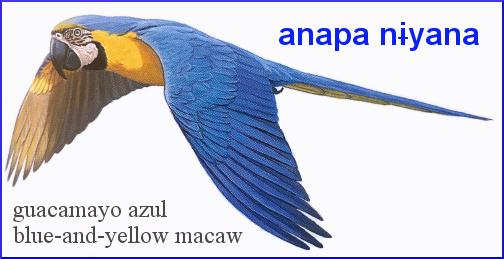 In addition to reaching the major milestones of releasing dictionaries, we have continued to produce and circulate teaching/learning materials in and on Iquito, designed for use in community homes as well as classrooms. The latest materials — including a few short stories, as well as booklets of monkeys, of fish, and of birds — are all available here at Cabeceras' website, in PDF form.
In addition to reaching the major milestones of releasing dictionaries, we have continued to produce and circulate teaching/learning materials in and on Iquito, designed for use in community homes as well as classrooms. The latest materials — including a few short stories, as well as booklets of monkeys, of fish, and of birds — are all available here at Cabeceras' website, in PDF form.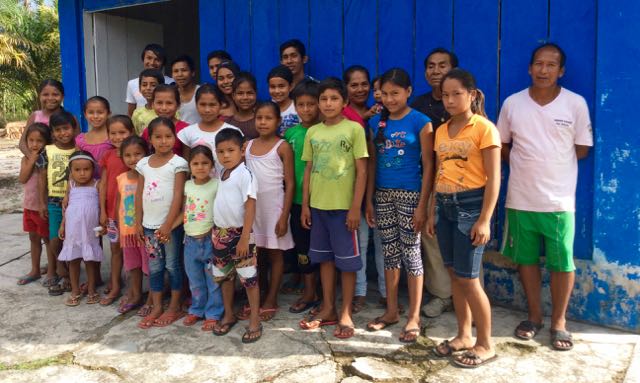
No less importantly, every time that I have returned to San Antonio de Pintuyacu, I have continued offering Iquito language classes to community members, in which I make very good use of all those materials that we've been producing. These classes have continued to be well attended by students of all sizes (see photo at right) and the enthusiasm of the littlest ones is an inspiration to the rest of us. Without a doubt, everybody's favorite classes are the days when we play Iquito bingo!
This year, we invite you to earmark your online contribution specifically to help cover the costs of printing and distributing our materials — on paper and free of cost — for any and all Iquito heritage community members, especially for young students.
To honor the lengthy 'labor of love' that is finally coming to light through our new dictionaries, we'd like to share a set of "then and now" photos of our dear teachers and co-authors, here below. Ligia (†November 2013) and Hermenegildo (†May 2016) may no longer be here with us in life, but their knowledge and creativity live on in their words, and especially in their stories.
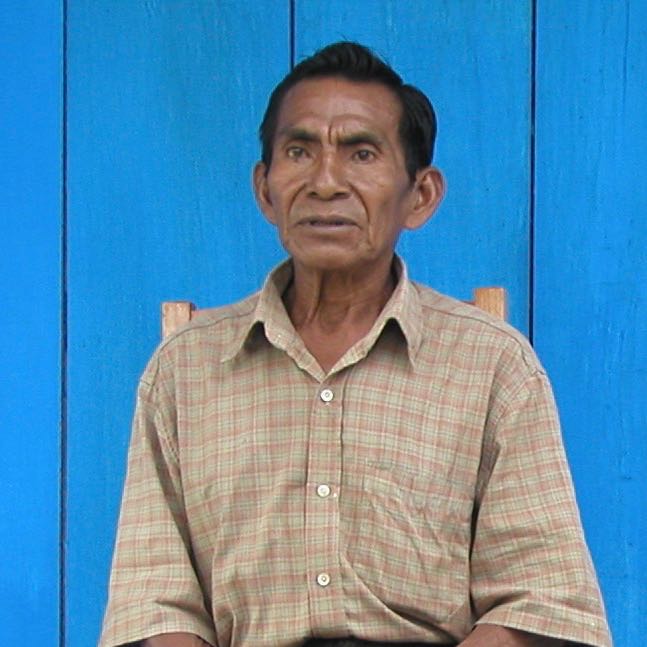 |
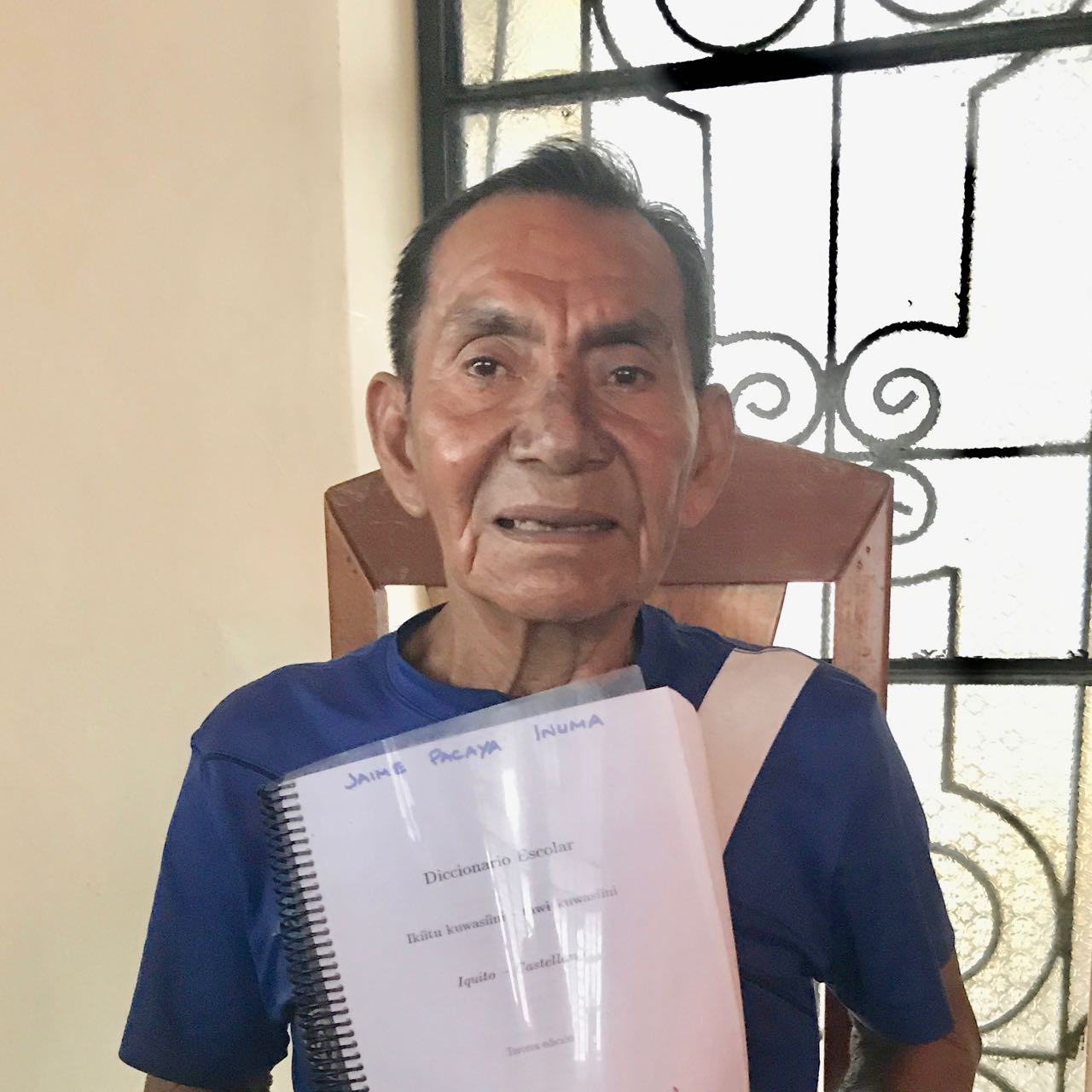 |
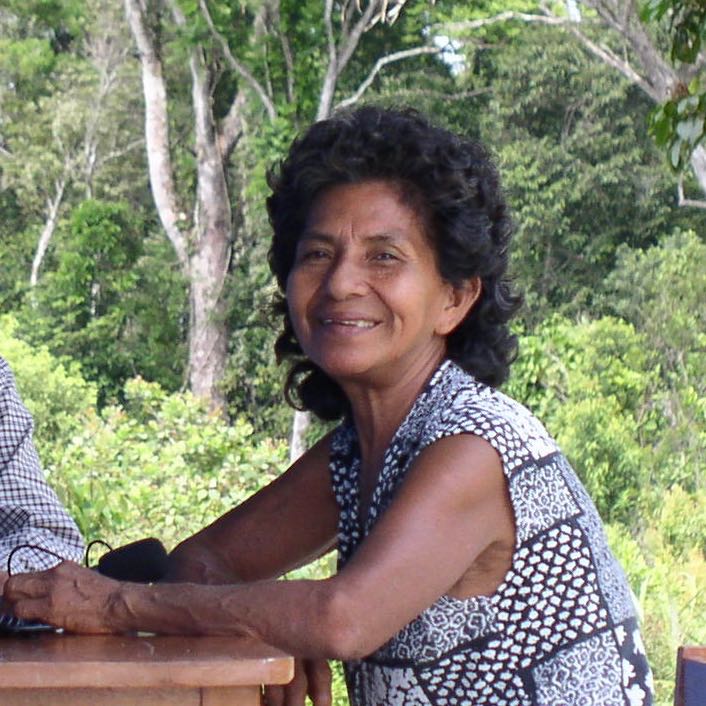 |
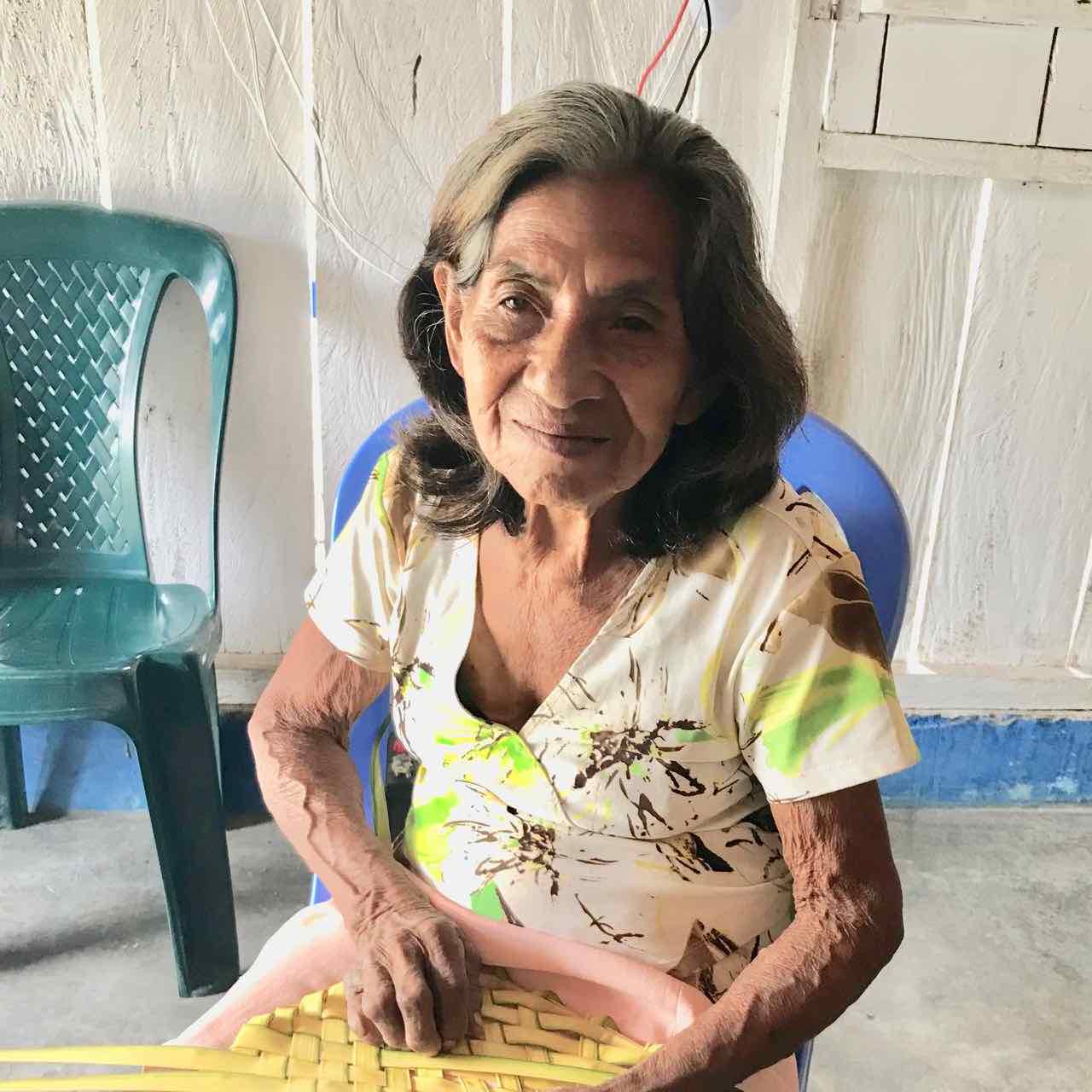 |
| Jaime Pacaya Inuma in 2002 and 2019 | Ema Llona Yareja in 2003 and 2018 | ||
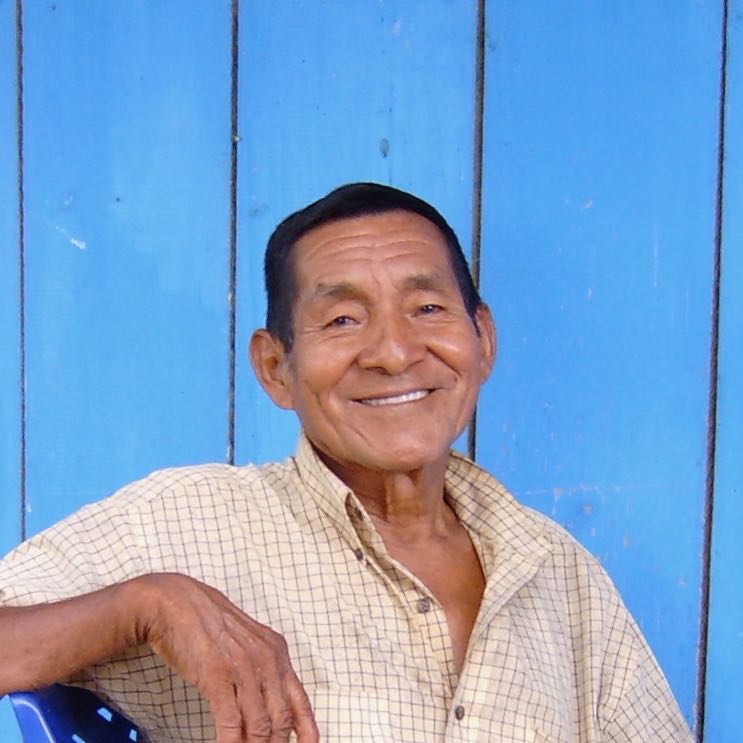 |
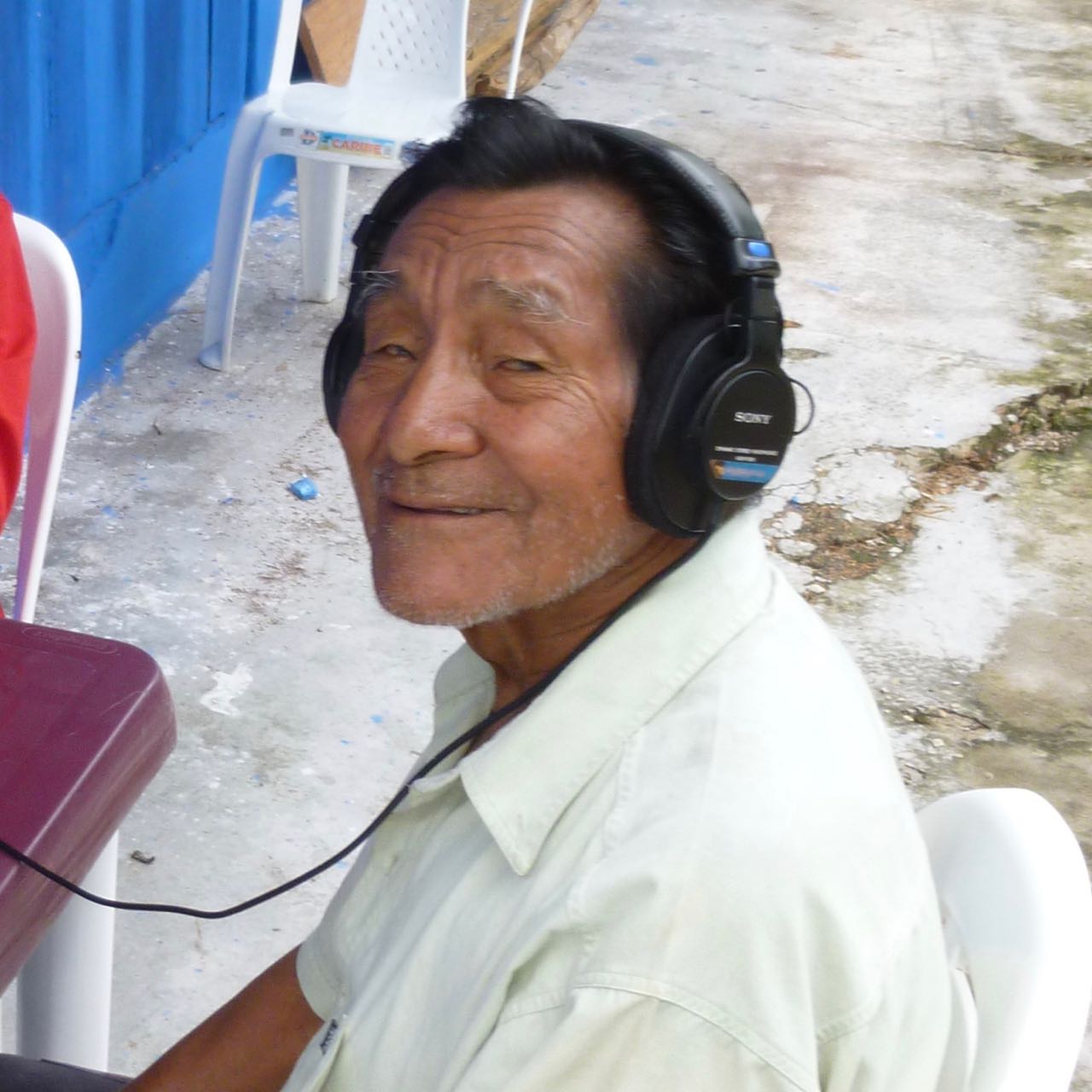 |
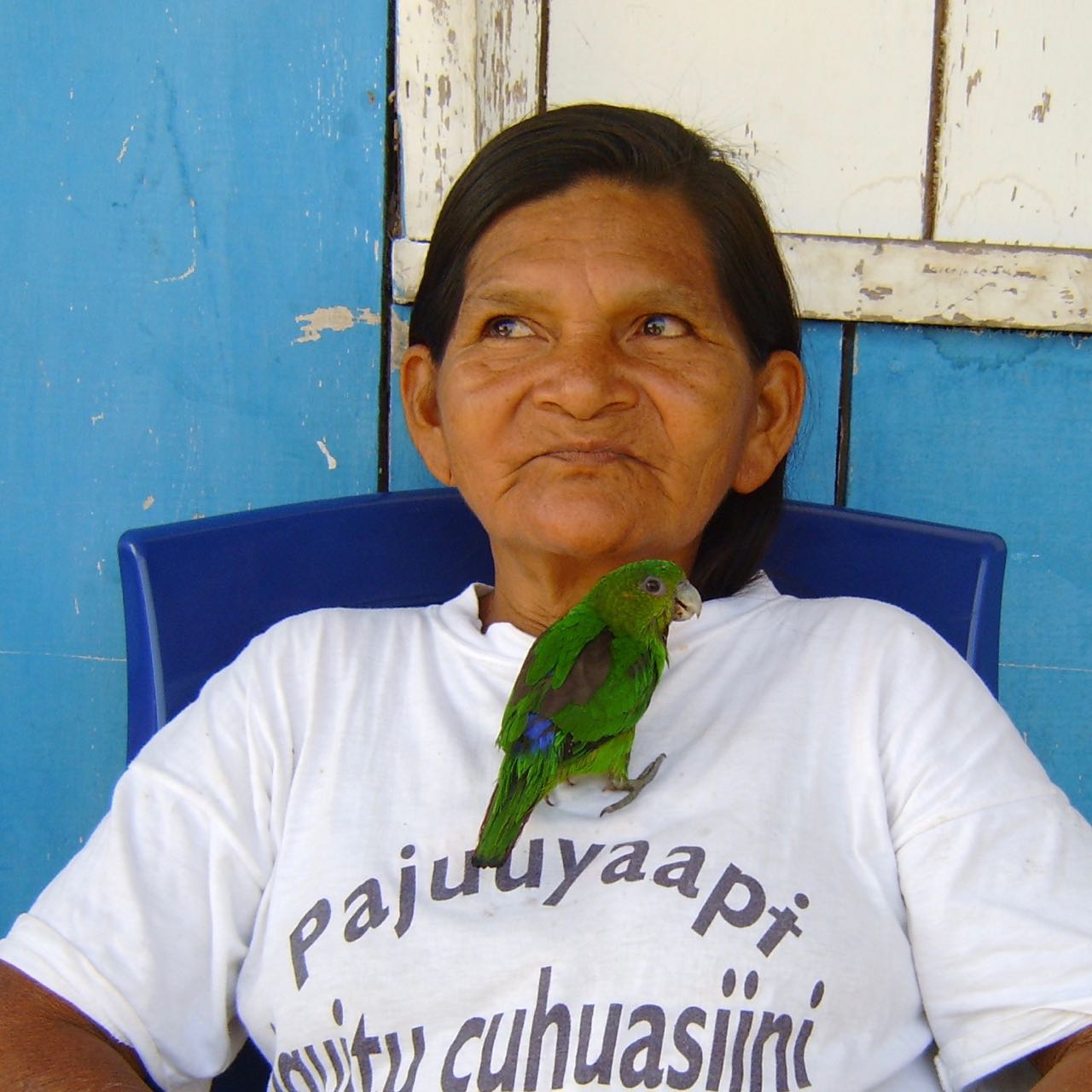 |
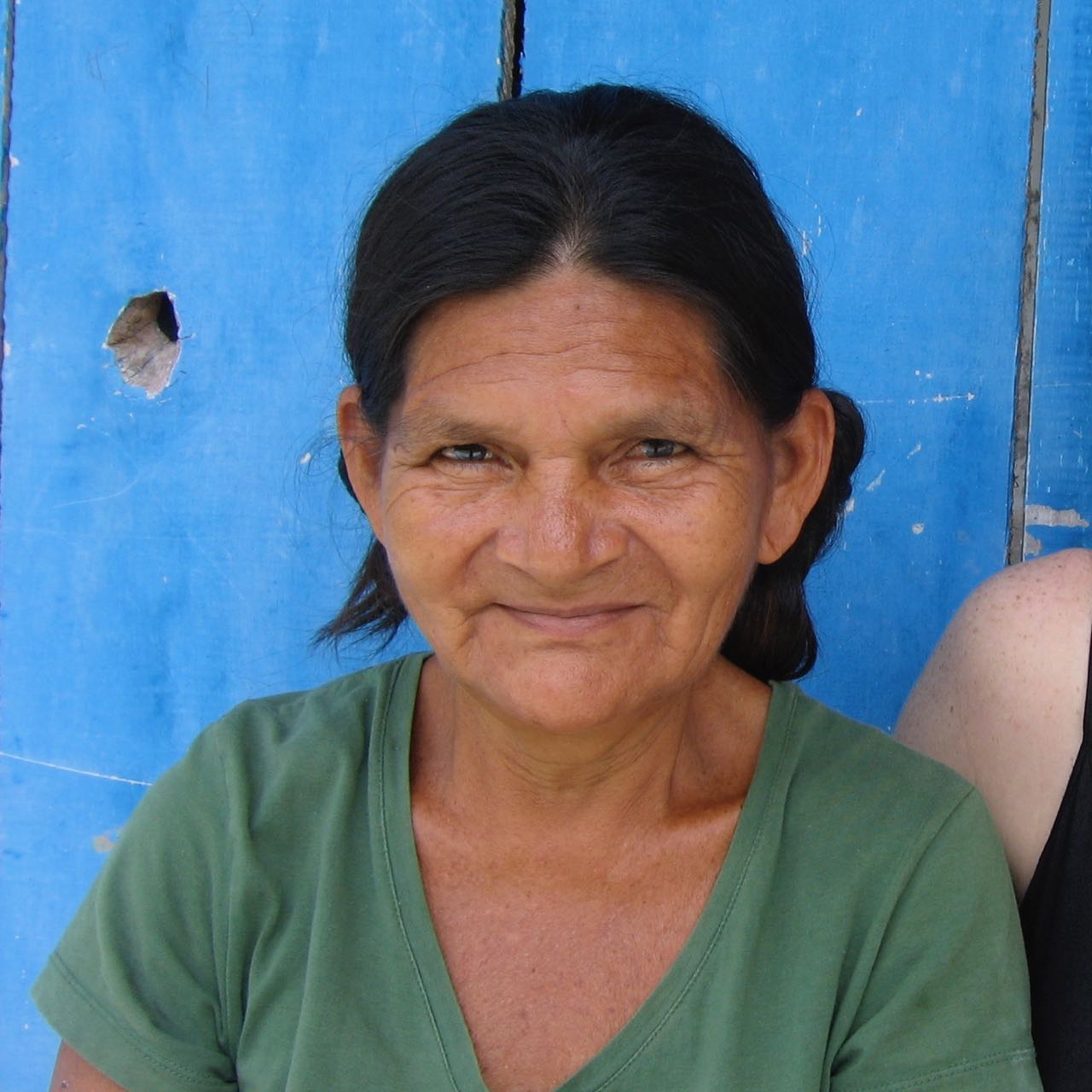 |
| Hermenegildo Díaz Cuyasa in 2005 and 2014 | Ligia Inuma Inuma in 2004 and 2006 | ||
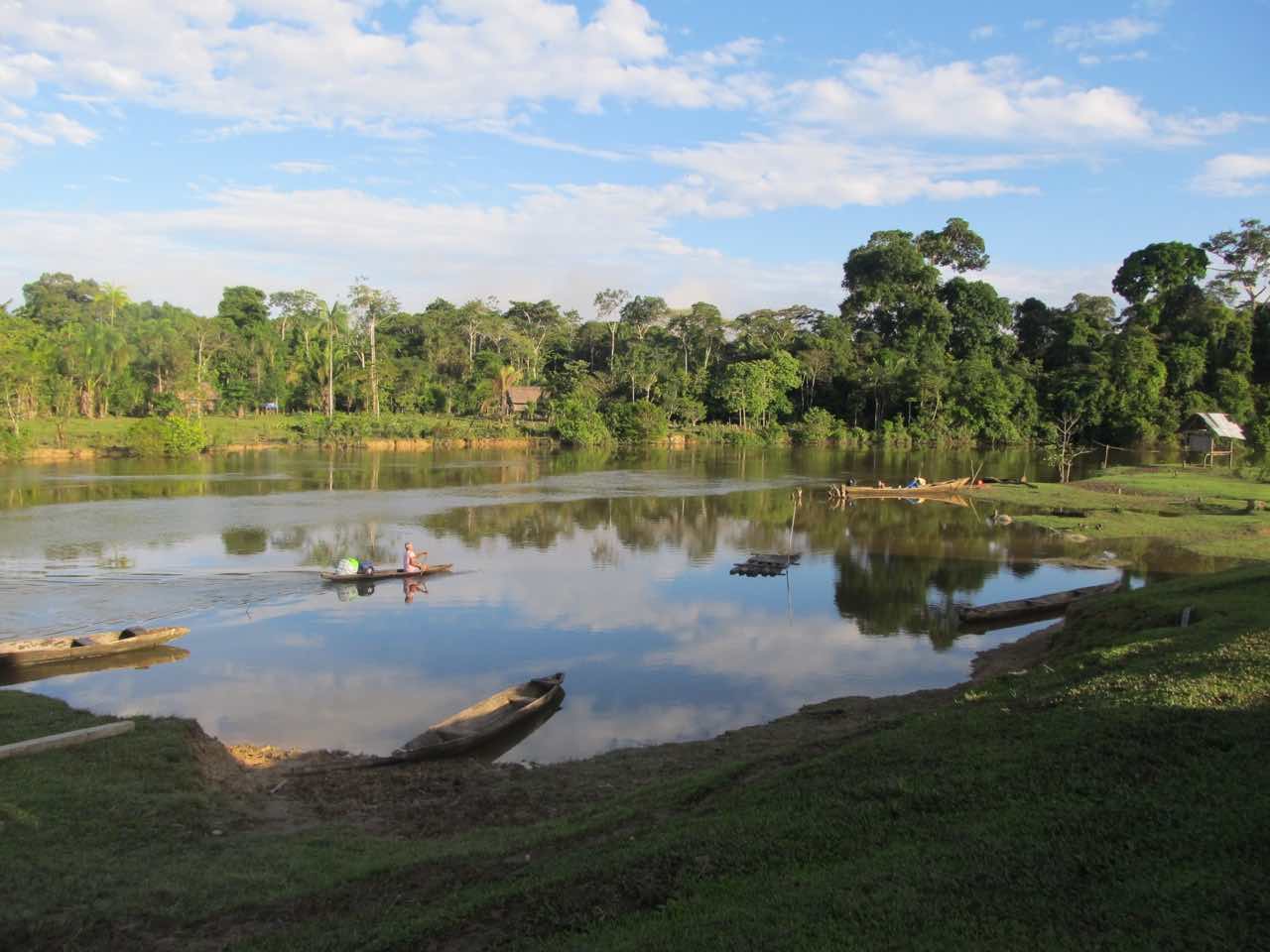 This Thanksgiving weekend, Lev and I were able to make a short but sweet visit to the Máíhuna communities of Nueva Vida and Puerto Huaman on the Yanayacu River. Nueva Vida (whose picturesque main port is pictured at left) is the community where our language research and revitalization work has been based since 2009.
This Thanksgiving weekend, Lev and I were able to make a short but sweet visit to the Máíhuna communities of Nueva Vida and Puerto Huaman on the Yanayacu River. Nueva Vida (whose picturesque main port is pictured at left) is the community where our language research and revitalization work has been based since 2009.
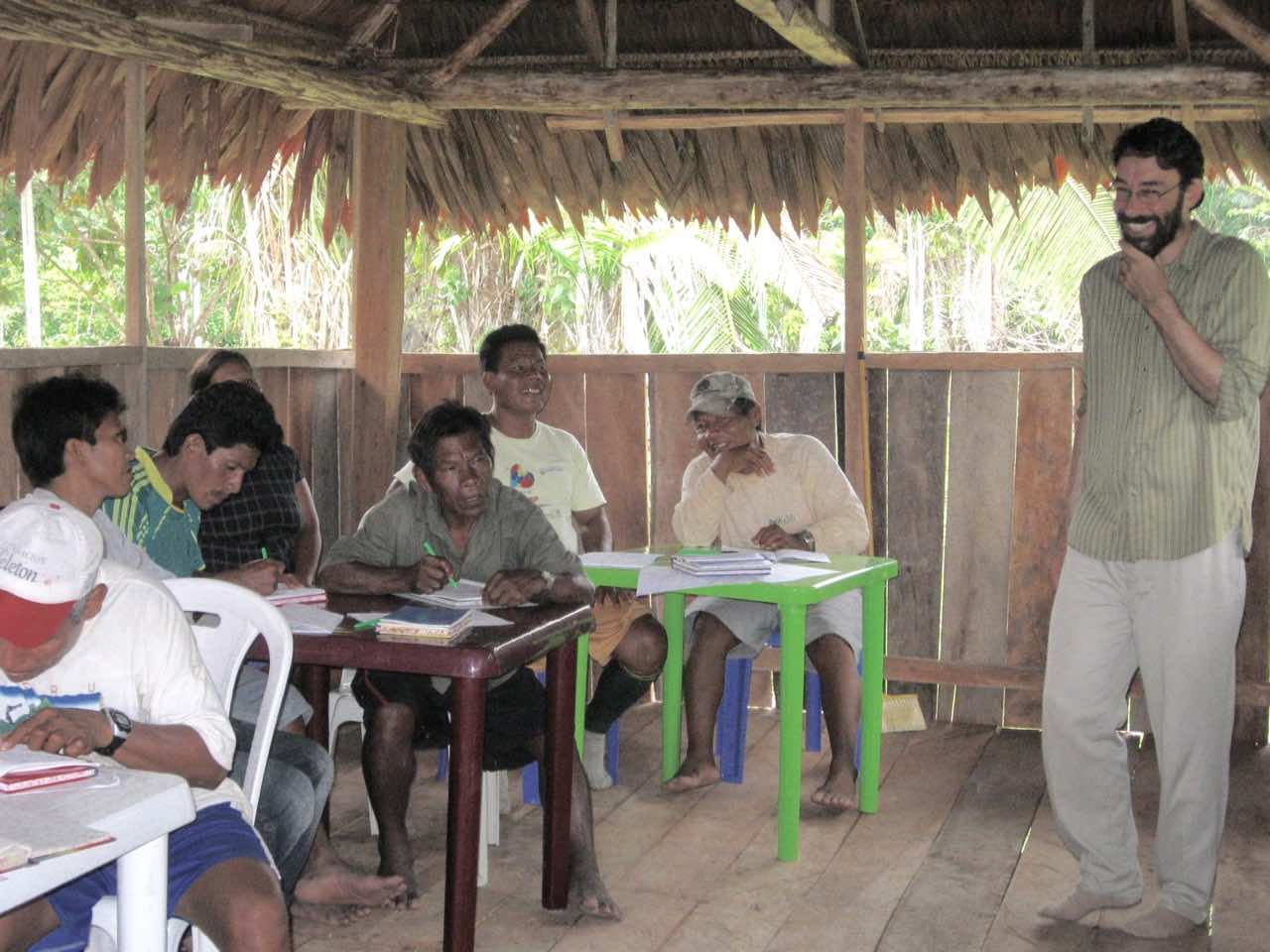 Although we haven't been able to spend extended periods of time with our Máí friends over the last few years as a consequence of our current commitments to the ILDP, we keep on keeping our friendships warm, with the hope that we'll be welcomed back when at last we're able to put together another large-scale language documentation and revitalization project based in Nueva Vida.
Although we haven't been able to spend extended periods of time with our Máí friends over the last few years as a consequence of our current commitments to the ILDP, we keep on keeping our friendships warm, with the hope that we'll be welcomed back when at last we're able to put together another large-scale language documentation and revitalization project based in Nueva Vida.
In the same vein, as part of our long-term commitment to the health and well-being of the communities with whom we work on language project, we have continued to respond to funding requests from the health post in Nueva Vida, in order to support the crucial and often life-saving work done by their dedicated staff.
In a spirit of optimism for future work with Máíhunas, we close here by sharing a picture, at right, of a jolly moment during one of our community workshops in 2011 with Máíhiki speakers.
As you may recall, Cabeceras' Nathaniel Gerhart Memorial Scholarship Fund began supporting Maribel Kaibi Omenki in 2012 on her path to becoming a registered nurse. Maribel is a Matsigenka woman from the community of Koribeni in Peru's upper Urubamba River Valley. Hard-working, courageous, and kind, Maribel was an obvious choice for our scholarship program, particularly because when we met heer, she already had both post-high-school training and professional work experience in community-directed healthcare.
This year, Maribel's dream came true — she is now a Registered Nurse!
As a result of her talents combined with her dedication, Maribel has been successful at every step along the way through her professional education. She carried out her coursework between 2012 and 2016; received her bachillerato in 2017; successfully wrote and submitted her Nursing thesis in 2018; and received her Licenciatura (registered title) in Nursing in January of this year.
At this point, Maribel is now several months into her rural internship, as mandated by Peru's Ministry of Health &mdash and she is, at long last, being paid a professional's salary for her work! Just this morning we spoke on the phone, and she told me that the internship is going very well. As she does every time we speak, she also expressed her gratitude to us and Cabeceras for our steady support at every stage of her journy.
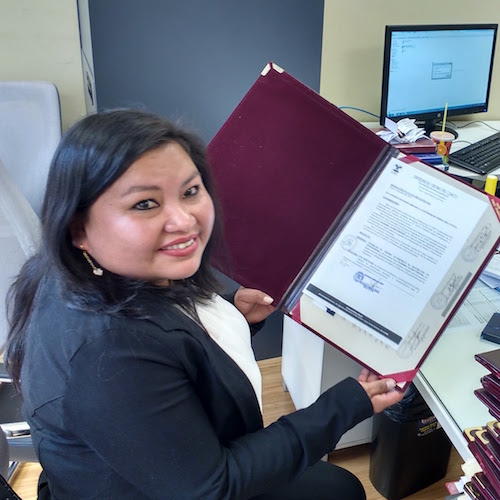 |
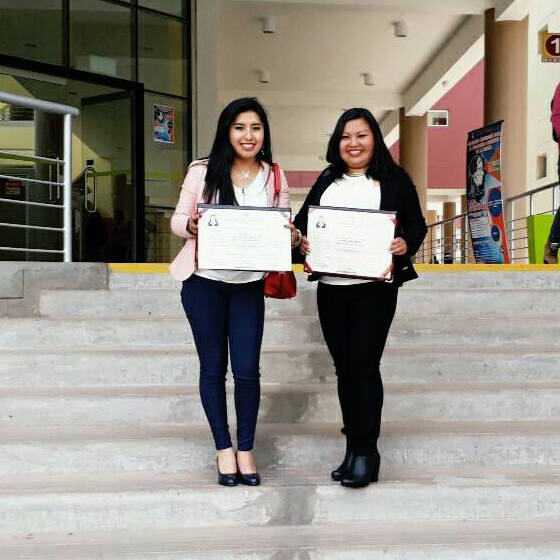 |
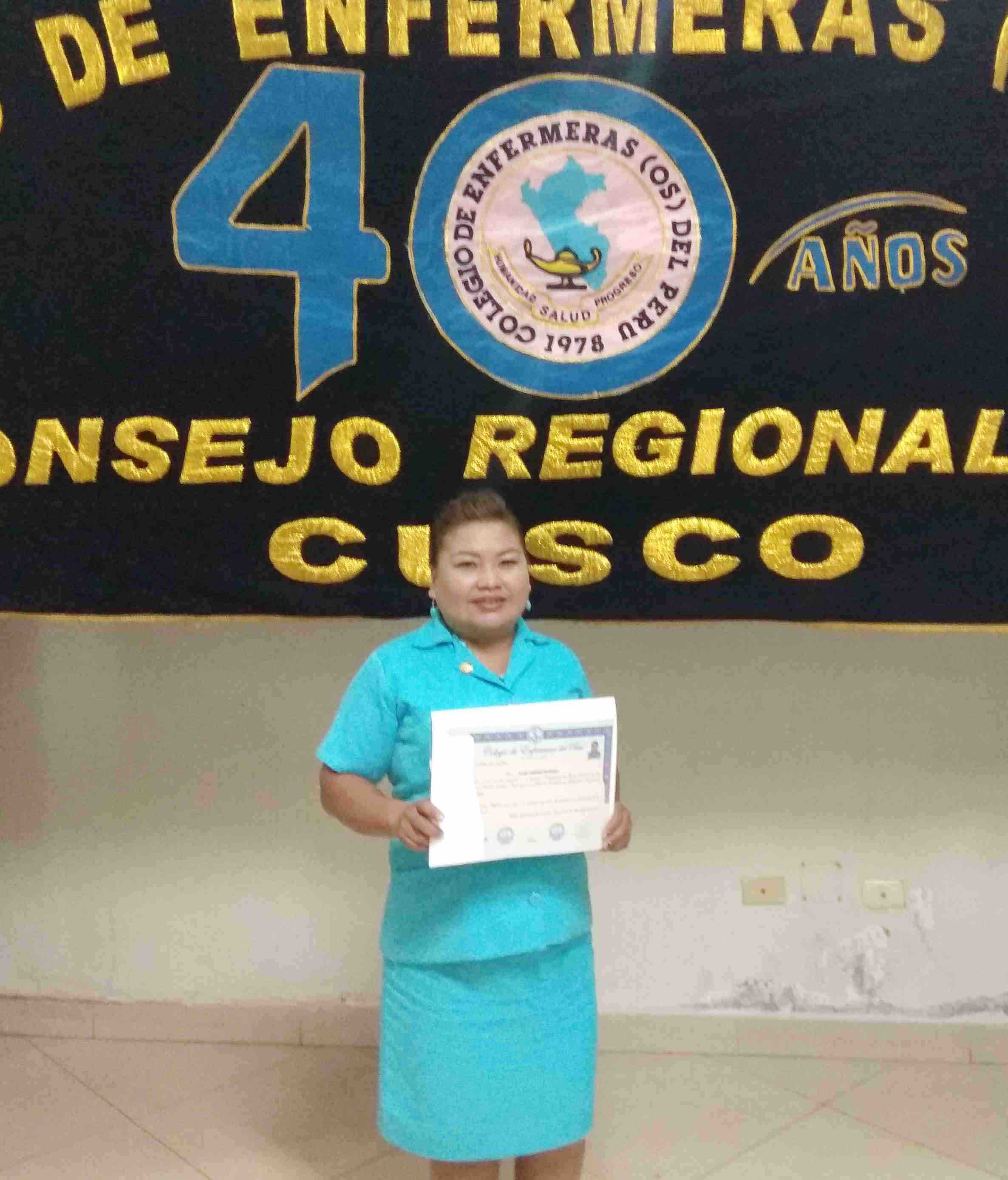 |
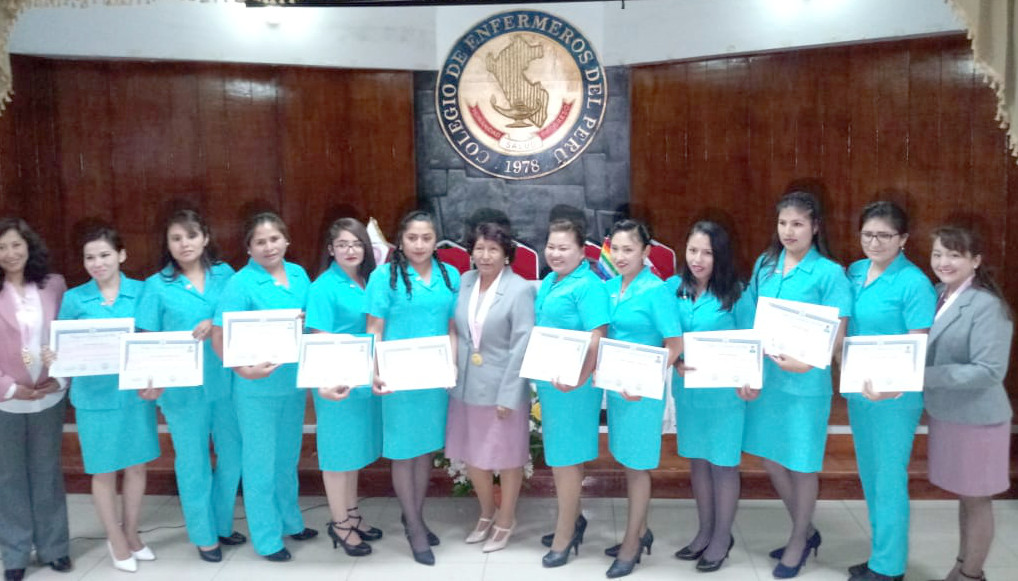 |
| Maribel Kaibi Omenki receiving her Bachelor's degree in 2017 at left; and receiving her professional licenture in 2019 at right. | |||
Since 2016, Cabeceras has been part of an international collaborative effort to support the long-term sustainability of AMAZONICAS, a unique bi-annual conference that is focused on Amazonian languages, the first of which was first held in Manaus, Brazil, in 2007.
This conference is an important place for people to gather who are dedicated to the documentation and description of Amazonian languages, enabling us to learn from and inspire one another. We Amazonianists are few enough in number that this bi-annual event is crucial to creating a vibrant community of otherwise widely scattered individuals.
In order to facilitate the participation of scholars from across Amazonia and its home countries, each of the seven AMAZONICAS gatherings so far has been hosted in a different place in South America. The seventh conference, held in May of 2018, was hosted in Baños, Ecuador, and it was another great success, much enjoyed by all. You can find additional information about AMAZONICAS in general at their new website.
Because a fundamental aspect of the vision of AMAZONICAS is to support both international collaboration and local participation in excellent scholarship on and with Amazonian languages, a key focus of our collaboration has been to establish a modest but durable financial foundation from which to develop future conferences. Cabeceras was able to make a unique contribution in this area by setting up a durable infrastructure through which both international and local AMAZONICAS organizers can carry out the successive fundraising campaigns that are necessary to make each international gathering possible in a new place.
The next event, AMAZONICAS VIII, will take place in central southeastern Brazil; the conference will be held at the Universidad Federal de Goiás from June 29 to July 30, 2020, followed by a field school from July 6 to 10, 2020 at the University of Brasilia. More information about AMAZONICAS VIII available here. As an organization, Cabeceras provides support services to AMAZONICAS, but none of our own general funds, so if you would like to make a targetted donation and become a 'Friend of Amazónicas', click here.
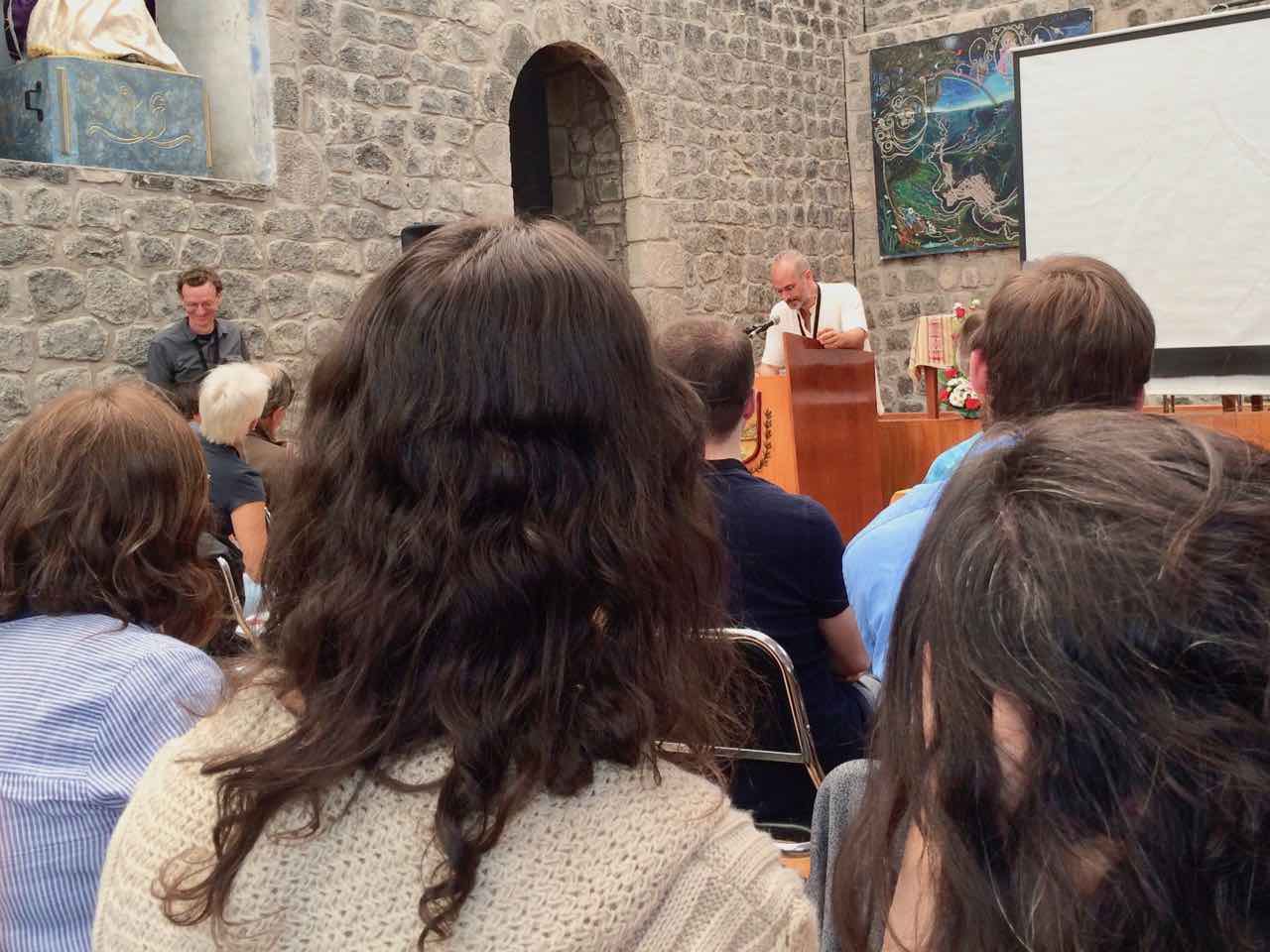 |
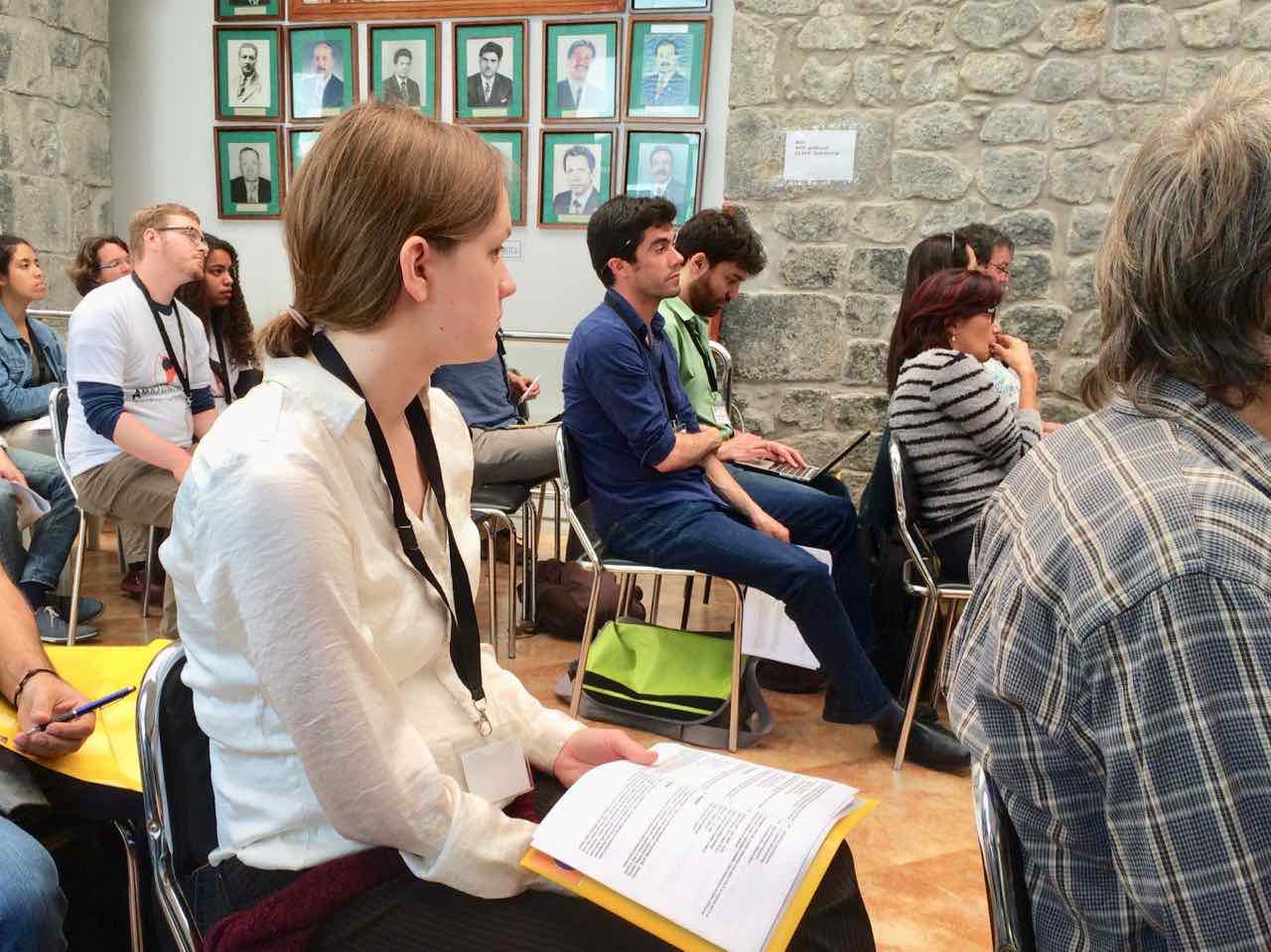 |
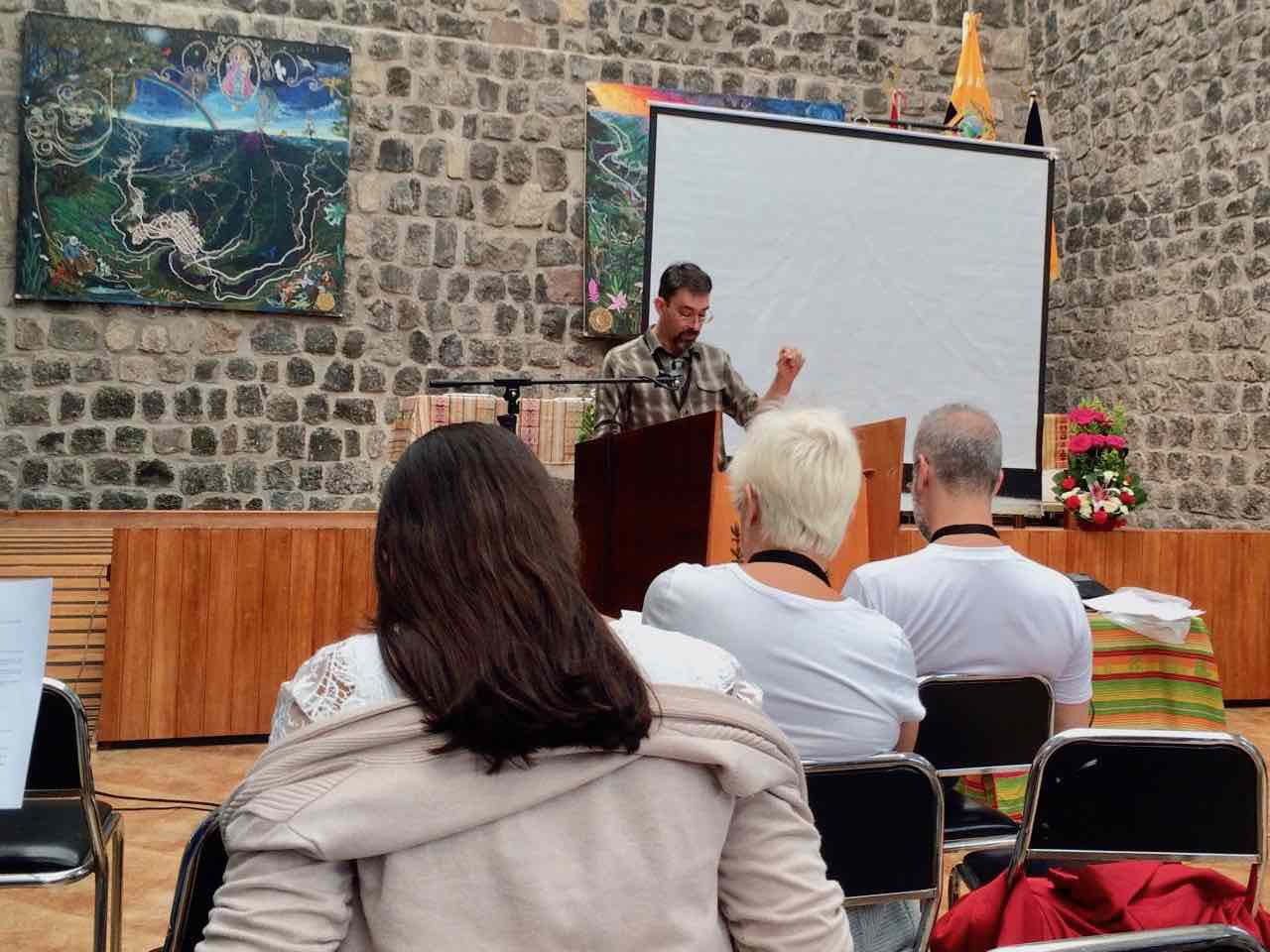 |
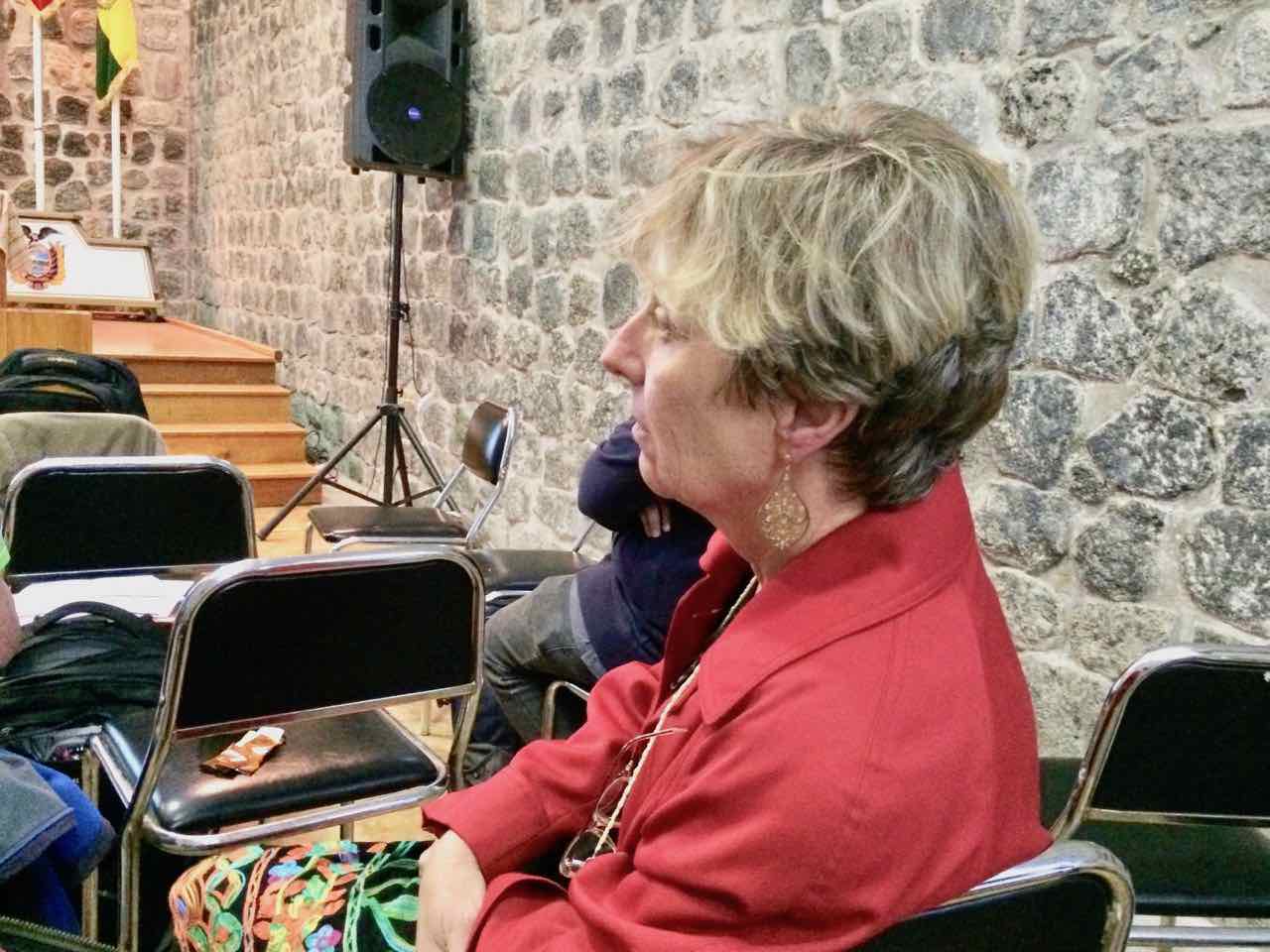 |
| Audiences and presenters at AMAZONICAS VII in Baños, including some long-time friends and/or collaborators, left to right: | |||
| Simeon Floyd and Andrés Salanova (both facing camera); Stephanie Farmer, Zach O'Hagan, and Adam Singerman (in middle row); | |||
| Lev Michael presenting; and board member Kris Stenzel. | |||
Beyond the larger-scale projects mentioned above, a few other ongoing smaller-scale collaborative projects deserve a mention here too! We continue to maintain our relationships with Kano Nete in Peru and with the Kotiria-Waikhana Project in Brazil, as well as taking opportunities to support Panara and other language vitality efforts spearheaded by friends and colleagues.
Finally, since collaboration is the engine that drives Cabeceras, we'd like to offer an opportunity to you to collaborate with us too, as an outreach volunteer for Cabeceras. Right now, it is simply not possible for me to do all of the work, especially the translation work into Spanish and the website maintenance, that we need and want to do, in order for Cabeceras' efforts to reach as large an audience as possible. Therefore, if you have some time and some skills that you'd like to share with Cabeceras in a voluntary capacity — specifically in the two areas of keeping our website more up-to-date; and of translating materials between English and Spanish — please contact me me via email at chris at cabeceras dot org!
That's all of our news for now! I'd like to close by saying thanks again for your ongoing support of Cabeceras. Cabeceras is a small-scale organization, with clear goals and time-tested strategies that are brought to life by a small team of dedicated volunteers, using a small but carefully-spent budget. Because we're such a lean operation, every single donation makes a meaningful difference in what is possible for us to do. All of our work is heartfelt — and so is our gratitude to every one of our donors and supporters. Thank you for being a part of Cabeceras!
| Dr. Christine Beier Secretary, Treasurer, co-Founder, Fieldworker |
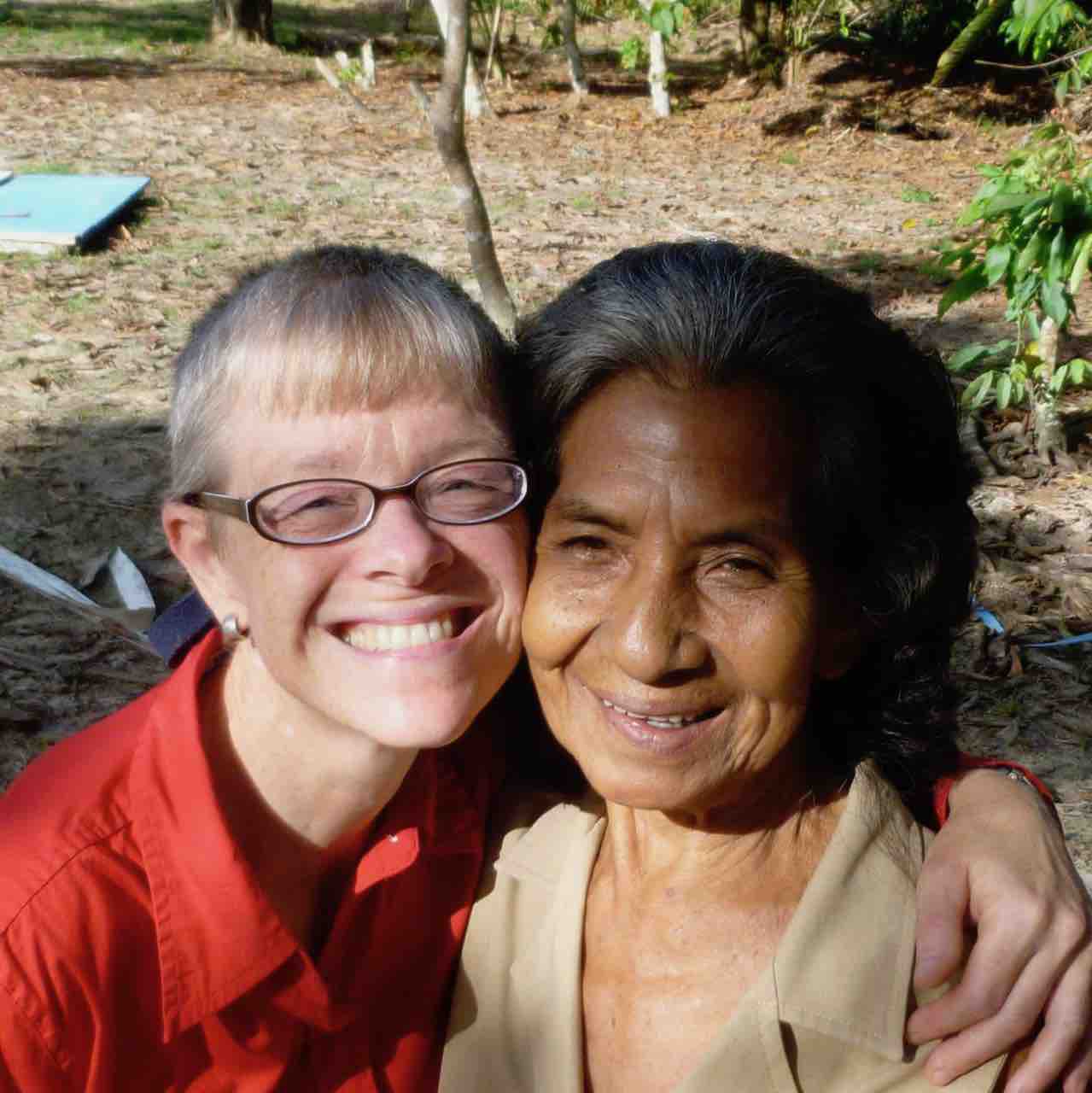 |
Cabeceras Aid Project 5859 Braesheather Drive, Houston TX 77096-3933 www.cabeceras.org |
 Back to top
Back to top